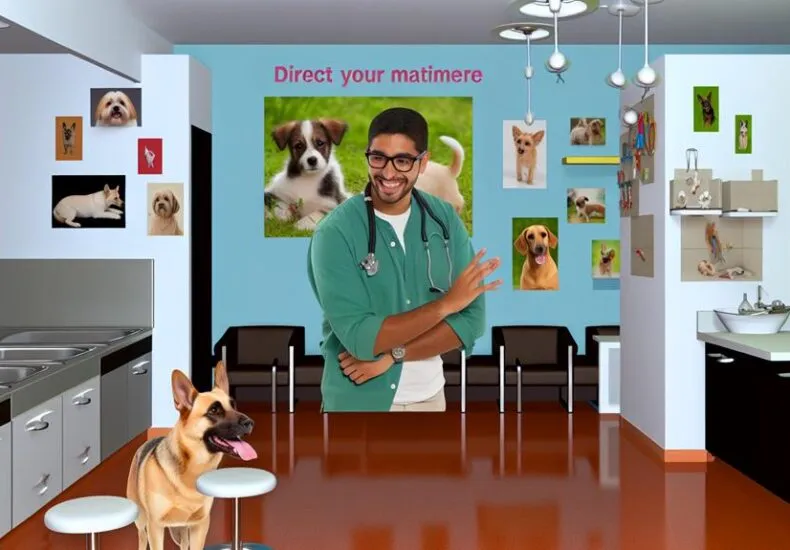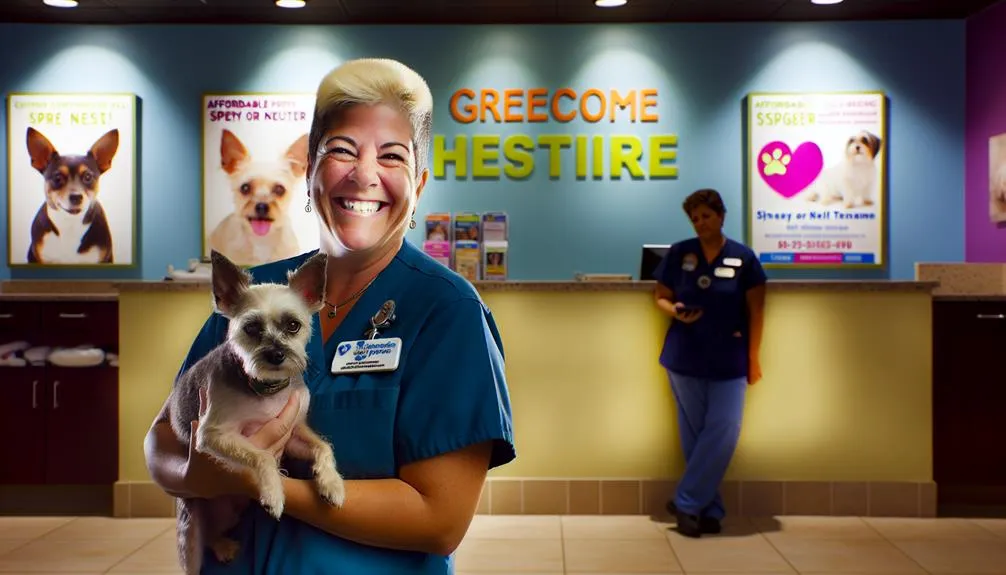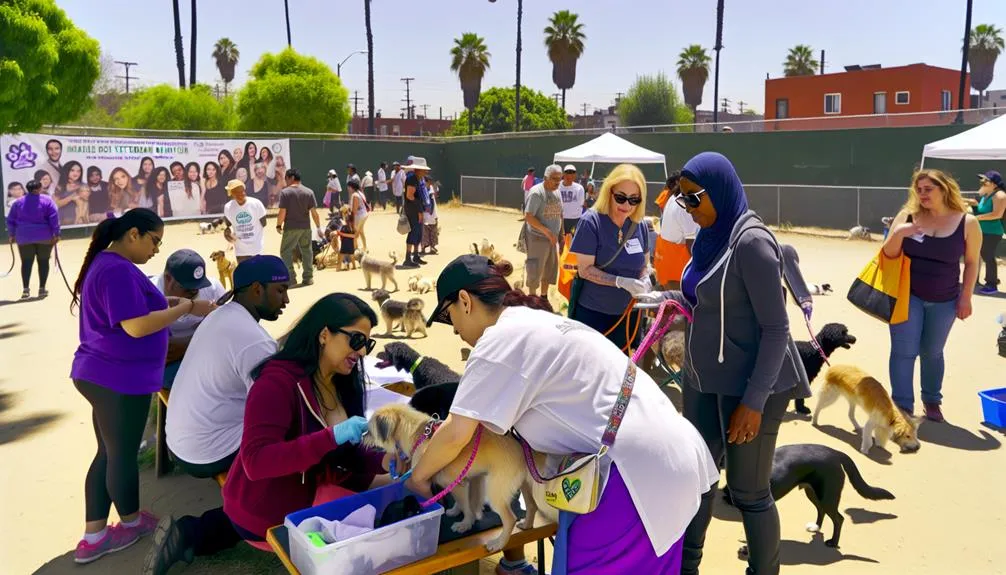
Where Can I Get My Dog Neutered
You might not know that the cost of neutering can vary greatly depending on where you go, with some options being surprisingly affordable. It's important to think about not just the price, but also the quality of care your dog will receive. From local veterinary clinics to community events, there are multiple avenues you can explore. Understanding these choices and their benefits can help you make an informed decision about your pet's health and welfare. What factors should you contemplate to guarantee you choose the right place for this procedure?
Veterinary Clinics
When evaluating where to get your dog neutered, veterinary clinics are often the best starting point. These clinics provide a professional environment with trained veterinarians and support staff dedicated to your pet's health and well-being. You'll find that veterinary clinics can offer a thorough approach, ensuring that your dog receives the necessary pre-operative evaluations, anesthesia management, and post-operative care.
One of the significant advantages of choosing a veterinary clinic is the assurance of quality care. Licensed veterinarians have the expertise to perform neutering safely and effectively. They can also guide you on the neuter benefits, which include reducing the risk of certain health issues, such as testicular cancer and prostate problems, as well as helping to curb behavioral issues like aggression or marking territory.
While it's important to evaluate veterinary costs, many clinics offer competitive pricing and may even have payment plans or options to make the procedure more affordable. Investing in your dog's health through neutering can save you money in the long run by preventing potential medical issues and unwanted litters.
Additionally, veterinary clinics are often equipped with the necessary tools and facilities to handle any complications that may arise during or after the procedure. It's essential to have access to professional medical care when your pet is undergoing surgery. By choosing a veterinary clinic, you're not only ensuring a safe procedure for your dog but also gaining peace of mind for yourself.
Animal Shelters
For many pet owners, animal shelters can be a valuable resource when considering neutering options for their dogs. Not only do shelters often provide low-cost or even free neutering services, but they also serve as a hub of information on pet care. Utilizing shelter resources can help you make informed decisions about your dog's health and well-being.
Here's a quick overview of what you might find at your local animal shelter:
| Neutering Services | Adoption Benefits | Additional Shelter Resources |
|---|---|---|
| Low-cost procedures | Reducing overpopulation | Educational workshops |
| Community outreach | Healthier pet population | Access to veterinarians |
| Support for pet owners | Finding loving homes | Behavior training classes |
When you choose to neuter your dog through an animal shelter, you're not only benefiting your pet but also contributing to the larger community. Neutering helps reduce the number of unwanted animals, which is a significant issue in many areas. Additionally, you can take advantage of the adoption benefits that shelters offer, such as discounted rates for adopting pets that have been spayed or neutered.
In addition to neutering services, shelters often provide educational resources aimed at promoting responsible pet ownership. This support can be invaluable as you navigate your pet's health needs. By considering an animal shelter for your dog's neutering, you're making a compassionate choice that supports both your pet and the wider community.
Low-Cost Spay/Neuter Programs

If you're looking for affordable options to get your dog neutered, low-cost spay/neuter programs are a great place to start. Many local animal shelters and nonprofit veterinary clinics offer these services at reduced rates, making it easier for you to provide the necessary care for your pet. Exploring these options can not only save you money but also contribute to the overall well-being of your community's animal population.
Local Animal Shelters
Local animal shelters often provide low-cost spay and neuter programs that can make a significant difference for pet owners. These programs not only help control the pet population but also promote the health and well-being of your furry companion. By utilizing shelter services, you can save money while ensuring your dog receives the necessary care.
Here's a quick overview of what you can typically expect from local animal shelters:
| Shelter Name | Location | Adoption Benefits |
|---|---|---|
| Paws & Claws Shelter | Springfield | Lower fees for adopting pets |
| Happy Tails Shelter | Riverside | Free vaccinations with spay/neuter |
| Furry Friends Rescue | Lakeview | Priority adoption for spayed/neutered pets |
| Safe Haven Shelter | Maplewood | Discounted adoption rates |
| Loving Paws Animal | Greenfield | Pet care workshops for adopters |
Nonprofit Veterinary Clinics
While animal shelters provide valuable resources for spaying and neutering, nonprofit veterinary clinics also play a significant role in making these services accessible. These clinics often offer low-cost spay and neuter programs, ensuring that pet owners can afford the necessary procedures to help control the pet population.
Many nonprofit clinics prioritize community outreach, partnering with local organizations to raise awareness about the importance of spaying and neutering. They often hold events that not only provide affordable services but also educate pet owners about responsible pet ownership. This proactive approach helps to reduce the number of unwanted animals in the community.
Additionally, nonprofit clinics frequently seek funding opportunities through grants and donations, allowing them to maintain low prices for their services. By supporting these clinics, you're contributing to a larger mission of animal welfare.
If you're looking for a cost-effective way to get your dog neutered, check out nonprofit veterinary clinics in your area. They can provide the care your pet needs while helping to foster a healthier community overall. Remember, every little effort counts in making a difference!
Mobile Veterinary Services
Mobile veterinary services are an increasingly popular option for pet owners seeking convenience and personalized care for their furry companions. These services bring the vet directly to your home, eliminating the stress of transportation for both you and your dog. One of the significant mobile vet benefits is the reduced anxiety many pets experience when they're in familiar surroundings. This can lead to a more relaxed environment for your dog during the neutering process.
With mobile surgery options, you can often find qualified veterinarians equipped to perform procedures like neutering right outside your door. This accessibility means you won't have to navigate the busy waiting rooms or long drives to a traditional clinic. In many cases, these mobile vets can provide pre-surgery consultations, guaranteeing you're fully informed and comfortable with the procedure.
Additionally, mobile veterinary services often offer flexible scheduling, making it easier to find a time that works for you. This convenience can be especially beneficial for pet owners with busy lives or those who may have difficulty traveling. Plus, the personalized attention your dog receives can enhance their overall experience.
When considering mobile veterinary services for neutering, it's essential to research the qualifications of the mobile vet and the equipment they use. You want to verify that your pet is in capable hands. By choosing this option, you're not just opting for convenience; you're prioritizing your pet's comfort and well-being.
Community Events

Community events can be a fantastic resource for pet owners looking to get their dogs neutered at an affordable cost. Many local organizations and animal shelters host these events, often partnering with veterinarians who provide low-cost or even free neutering services. By participating in these community outreach programs, you not only help control the pet population but also contribute to overall dog health in your area.
These events typically feature a variety of services beyond neutering, such as vaccinations, microchipping, and educational sessions on responsible pet ownership. You'll find that many community events promote awareness about the importance of spaying and neutering, emphasizing the positive impact on your dog's health and behavior. Neutering can help prevent certain health issues and reduce the likelihood of unwanted behaviors, making for a happier, healthier pet.
To find out about upcoming community events, check your local animal shelter's website or social media pages. They often announce special days dedicated to spaying and neutering, along with other veterinary services. Additionally, local pet stores and veterinary clinics may have flyers or information about these events.
Participating in community events is not only beneficial for your dog but also strengthens the bond between pet owners and the community. It's a wonderful way to guarantee your dog's health while also supporting the broader mission of responsible pet ownership. Don't miss out on these opportunities to care for your furry friend!
Private Pet Hospitals
If you're unable to attend community events for neutering your dog, private pet hospitals offer another dependable option. These facilities are staffed by experienced veterinarians who specialize in pet care, guaranteeing your furry friend receives excellent attention throughout the procedure. Choosing a private veterinary practice often means shorter wait times and more personalized service, which can make the process smoother for both you and your dog.
When you opt for a private pet hospital, you can expect a thorough pre-surgical evaluation. This may include health screenings and consultations to discuss the procedure, its benefits, and any potential risks. The skilled staff will guide you through each step, addressing any concerns you might have.
Neutering your dog comes with numerous pet health benefits. It can reduce the risk of certain cancers and prevent unwanted behaviors, like marking territory or roaming. Additionally, it helps control the pet population, which is vital for community welfare.
Private veterinary practices often provide a comfortable environment, equipped with modern technology and facilities to monitor your pet's recovery effectively. Post-operative care is also an important aspect of the service, making sure your dog heals well and has a smooth change back to normal activities.
Ultimately, choosing a private pet hospital for neutering your dog guarantees you're making a responsible decision for their health and well-being.
Referrals From Local Pet Owners

Asking fellow dog owners for referrals can be an invaluable way to find a trustworthy place to get your dog neutered. Local pet owners often have firsthand knowledge of various veterinary clinics and can share their personal dog owner experiences. This insight can help you gauge the quality of care, professionalism, and compassion that each facility offers.
When you reach out to your community, be specific in your inquiries. Ask about the overall experience they had, including the pre-surgery consultations, the procedure itself, and the post-operative care. You might also want to inquire about the clinic's pricing, as costs can vary considerably. Gathering a few recommendations will give you a broader perspective and help you make an informed decision.
Additionally, consider joining local pet groups on social media or community forums. These platforms can provide a wealth of pet care tips and recommendations based on the experiences of other dog owners. Don't hesitate to ask questions and engage in discussions; many pet owners are happy to share their insights.
Frequently Asked Questions
What Age Is Ideal for Neutering My Dog?
The ideal age for neutering your dog often falls between six to twelve months. However, it's crucial to reflect on neutering myths and potential behavioral changes, consulting your vet for tailored advice based on your dog's needs.
How Much Does Neutering Typically Cost?
When considering neutering, you might be surprised by the varying costs. Neutering options depend on factors like your dog's size, age, and the facility's location, typically ranging from $50 to $300.
Will My Dog Experience Pain After the Procedure?
Your dog might experience some discomfort post-surgery, but effective pain management is typically provided. Following proper post-surgery care will help guarantee a smooth recovery, minimizing pain and allowing your pet to heal comfortably.
What Are the Health Benefits of Neutering My Dog?
Neutering your dog can lead to positive behavior changes and reduce aggressive tendencies. It also minimizes the risk of certain cancers and unwanted litters, promoting better long-term effects on your pet's health and well-being.
How Long Is the Recovery Period Post-Neutering?
After the neutering procedure, your dog typically requires about 10 to 14 days for recovery. During this time, attentive post-operative care is essential to guarantee healing and prevent complications. Always follow your vet's guidance.
Conclusion
To summarize, neutering your dog is an important decision that can lead to a healthier, happier pet. Whether you choose a local veterinary clinic or a low-cost program, options are available to suit your needs. For instance, a pet owner named Sarah found affordable neutering through a community event at her local animal shelter, saving both money and ensuring her dog's well-being. By exploring your options, you can make a responsible choice for your furry friend.
You may also like
Archives
Calendar
| M | T | W | T | F | S | S |
|---|---|---|---|---|---|---|
| 1 | 2 | 3 | 4 | 5 | 6 | |
| 7 | 8 | 9 | 10 | 11 | 12 | 13 |
| 14 | 15 | 16 | 17 | 18 | 19 | 20 |
| 21 | 22 | 23 | 24 | 25 | 26 | 27 |
| 28 | 29 | 30 | ||||
Leave a Reply